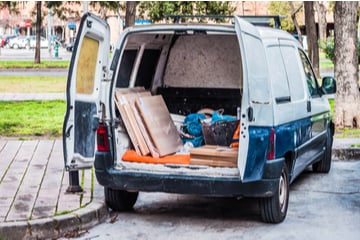Wondering when your van’s MOT is due? Or what you need for it to pass? Here we explain what’s involved in a van MOT check, how to prepare, and what to do if your van fails the test.

What are van MOTs?
Much like cars, vans over three years old need an annual health check. The van MOT is a test required by the Driver and Vehicle Standards Agency (DVSA), which makes sure your van is safe and legal to drive.
Your van needs to meet certain safety regulations to pass. If your van is a class 4 vehicle, you can get an MOT check at any garage which does car MOTs. And when it passes the test, your van MOT certificate is valid for one year.
Do I need an MOT for my van?
In short, yes. Your van needs a valid MOT if it's used on public roads. So unless your van is parked up on private property and not being driven, you'll need to make sure it's roadworthy and the paperwork is in order.
It's a good idea to add the MOT due date to your calendar. If you forget and drive your van out of MOT, you could face a fine and your van insurance could be invalidated.
How do I know when my van MOT is due?
Your van MOT expiry date will be on your current MOT certificate. But don't worry if you can't find it – use our MOT check tool. All you need to do it tap in your van's registration.
Is a van MOT different from a car MOT?
It depends on the van. All vehicles fall into a specific MOT class, with Class 4 being the most common category. This includes most road vehicles. More often than not, a van will be a Class 4 vehicle, meaning it's tested in the same way as a car.
Larger transit vans can fall into Class 7 though, as do many commercial vehicles such as lorries and trucks. While the test for a Class 7 van is a little different and generally more costly, the principles are basically the same. Both types of test will ensure the van meets certain safety standards.
Which MOT class is my van?
Whether your van needs a Class 4 or Class 7 MOT will be down to its gross weight. That's the weight of the van, plus the maximum amount of weight it can carry.
If the van and its maximum laden weight is less than 3,000kg, it'll fall into Class 4. This will be the case for most vans. But if its maximum laden weight is between 3,000kg and 3,500kg, then it'll fall into Class 7.
What if my van's MOT is overdue?
If your van's MOT has expired, then you can only drive it if you're going directly to an MOT garage for a test or retest. You also might be able to drive it if you're taking it for a repair. If you're stopped by police, you may need to prove you have an appointment with the garage.
If you drive the van without a valid MOT for any other reason, you could be fined up to £1,000. Plus your van could potentially be impounded.
How much does a van MOT cost?
The maximum MOT you should pay for a Class 4 van is £54.85, or £58.60 for a Class 7 van. MOT garages are bound by these maximum prices, which are set by the Driver and Vehicle Licensing Agency (DVLA).
There are likely to be further costs if your van fails the test, and needs work in order to pass. Often the retest is free if you have it done at the same test centre within 10 days. But you'll have to pay for parts and labour.
How can I save on van MOT costs?
The best way to save on the cost of MOT checks is to keep your van in tip-top condition. Making sure it's in a good state of repair and serviced regularly increases the chance of passing the MOT first time.
Another way to save on the MOT itself is to shop around. The prices above are the maximum that garages can charge, but you may be able to find cheaper tests. It may also be worth checking on local deals sites to see if there are any promotional offers you can take advantage of.
What is checked in a van MOT?
You can see a detailed list of what's checked in an MOT at GOV.UK. But at a glance, the garage checks these things to ensure your van is roadworthy and meets environmental standards:
- The van's body and structure, checking for things like rust and corrosion.
- The towbar should be secure and in working order.
- The garage should check the fuel system for leaks. Pipes and hoses should be in good condition, and everything should be sealed securely.
- They should check the van's exhaust and emissions to make sure they meet environmental standards. They mustn't be too noisy, or emit smoke.
- They test the brakes to make sure they're safe, including the handbrake.
- All lights, including headlights, indicators and brake lights, to make sure they're working and also positioned correctly.
- The doors, bonnet and boot must all open and close properly.
- Safety features such as your seats, seatbelts and airbags must all work correctly and efficiently.
- The suspension and steering to make sure all's safe and correct.
- Your tyres and wheels must be in good condition, and the tyres should have the correct tread depth too.
- Your windscreen and wipers to make sure everything's working properly and you have good visibility.
Checklist: How Can I Prepare My Van for an MOT?
To give your van the best chance of passing its MOT, here are some checks you can perform yourself beforehand:
Check the Lights
This is best done with two people. Sit in the driver’s seat and get someone to confirm all your lights are working properly. Check the following:
- Headlights
- Rear lights
- Fog lights
- Brake lights
- Indicators
- Hazard lights
Check the Wheels and Tyres
Inflate your tyres to the recommended pressure. Make sure the wheel bolts are tightened. Check your tyres aren't damaged, and that each tyre has the minimum legal tread depth. Do this by putting a 20p coin in one of the main grooves of the tyre. If your tyre has the legal tread depth, you shouldn't see the outer rim of the coin.
Check the Windscreen and Wipers
Check for chips on the windscreen. Make sure the washers have enough fluid in them. Turn the wipers on to make sure they're clearing the windscreen effectively.
Check the Other Fluid Levels
Ensure you have sufficient levels of the following:
- Engine oil (between ‘Min’ and ‘Max’ on the dipstick)
- Brake fluid
- Power steering fluid
- Coolant
Check Your Van’s Exterior and Number Plate
Make sure all the bodywork is in good condition. Check for rust, or anything which could come loose. Also check your number plate to make sure it can be seen clearly. Plus it won't hurt to give your van a good wash before its MOT, as this will ensure good visibility.
Check the Seatbelts
Seatbelts are a very important safety feature, so quickly check them to make sure they all fasten and release properly.
Why do vans fail MOTs?
According to government MOT figures, in 2023-24, roughly 29% of Class 4 vehicles and 36% of Class 7 vehicles fail their initial MOT checks.
This can be for any of the reasons stated above. Among the most common reasons Class 4 vehicles fail their tests are:
- Issues with lighting and signalling
- Suspension issues
- Problems with brakes
- Problems with tyres
- Issues affecting the driver's view of the road
What should I do if my van fails its MOT?
If your van fails its MOT, you'll be given a certificate which identifies the issues that need to be fixed. This is known as an MOT refusal or VT30 form. You cannot drive the van until its faults are fixed, so it can be retested.
You now have two options. You can either leave it at the test centre to be fixed. This'll only require a partial retest, which will be free if it's done within 10 working days.
The other option is to take it away for repairs, either conducted by yourself or another mechanic. Returning it to the original MOT garage for a partial retest the next day should be free of charge. Otherwise, you can take it back within 10 days for a reduced fee.
How to maintain your van’s MOT readiness year-round
The best way to make sure your van flies through its MOT is to keep it in good condition all-year round. You shouldn't leave maintenance to the last minute, but rather stay on top of it at all times.
As well as performing the checks listed above, you should take your van in for regular servicing. This means numerous parts of your van are kept in good working order, including:
- Oil and filters
- Water and other fluids
- Engine and battery
- Lights, including new bulbs
- Brakes, including replacing brake pads
- Tyres
- Suspension
- Warning lights







